Key takeaways:
- Understanding financial challenges involves recognizing the emotional impact of money and the importance of discussing experiences with others for support.
- Setting realistic financial goals using the SMART criteria fosters a sense of achievement and helps in maintaining motivation while managing finances.
- Building resilience through money challenges requires a positive mindset, transparency about struggles, and developing a safety net for emergencies.
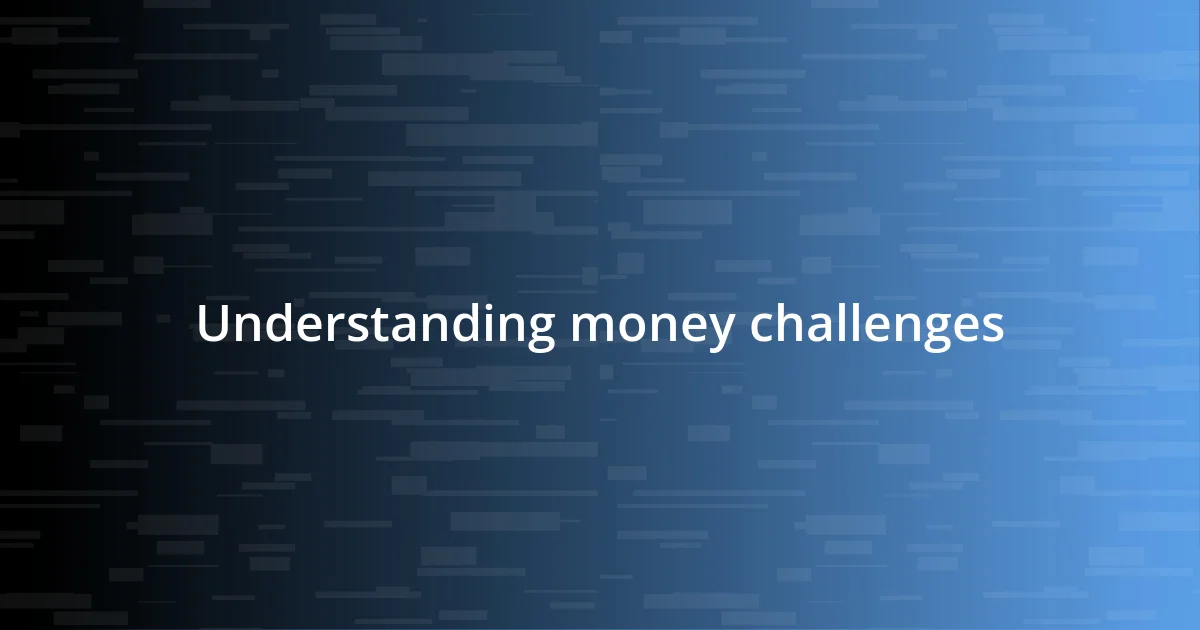
Understanding money challenges
Money challenges often arise from a mix of unexpected expenses and poor budgeting choices. I remember the time my car broke down right before the holidays. I felt overwhelmed, not just by the cost but by the mounting pressure of wanting to maintain a joyful season for my family. It made me realize how easy it is to lose control when faced with financial stress.
When I look back on my own experiences with money hurdles, I understand that these challenges are not just about dollars and cents but also about our emotional responses to them. Have you ever felt that sinking feeling when your bank account dips lower than you’d hoped? That’s a reminder of how closely intertwined our emotions are with finances; it’s as if each dollar represents a part of our sense of security and wellbeing.
Over time, I’ve learned that addressing money challenges isn’t just about finding quick solutions—it’s about understanding our behaviors and attitudes toward money. For instance, I used to shy away from discussing finances with friends, but opening up about my struggles provided valuable perspectives and support. This taught me that sharing experiences can transform money challenges into opportunities for growth.
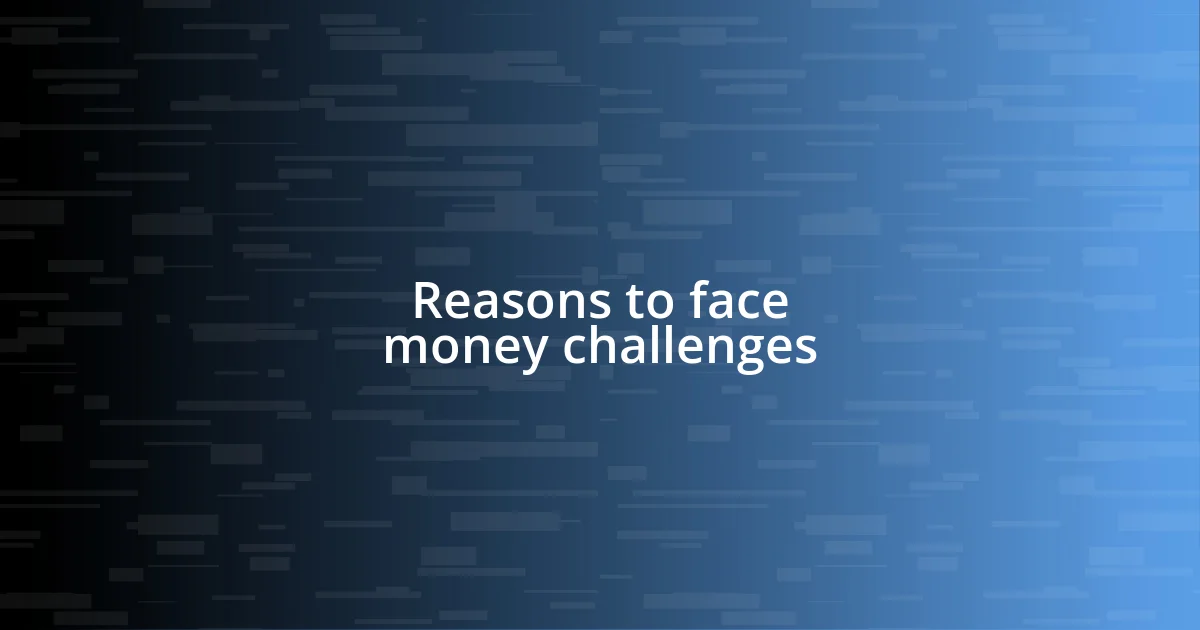
Reasons to face money challenges
Facing money challenges is essential for developing a better understanding of our financial landscape. I vividly remember a time when I tackled my own budget shortfall. Instead of feeling defeated, I sat down with my expenses and income, and to my surprise, this deep dive revealed patterns in my spending that I didn’t notice before. This process not only helped me regain control but also equipped me with the skills to navigate subsequent hurdles with confidence.
Here are a few compelling reasons to confront your money challenges head-on:
- Build Financial Literacy: Overcoming money obstacles enhances your knowledge about budgeting, saving, and investing.
- Foster Resilience: Each challenge you tackle builds your confidence, making future financial struggles feel more manageable.
- Improve Relationships: Discussing financial issues with family or friends can strengthen your bonds and even invite collaboration on solutions.
- Encourage Goal Setting: Facing financial difficulties encourages you to set clear financial goals, leading to a more intentional approach to spending and saving.
The emotional journey through these challenges can be transformative, reminding me of the importance of staying proactive rather than reactive.
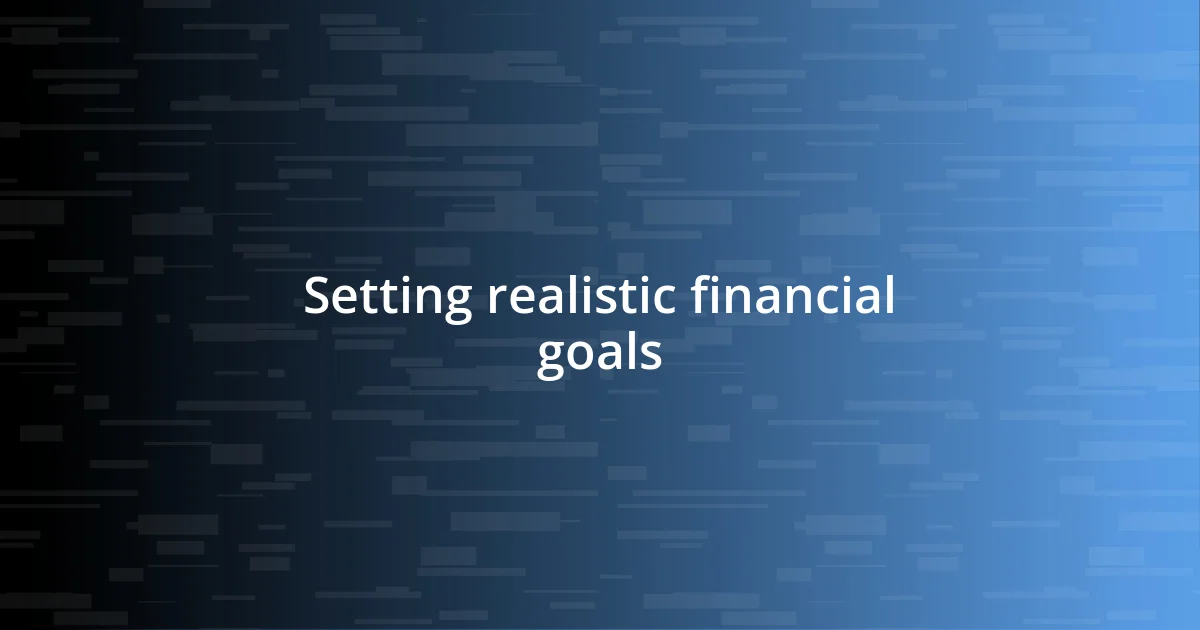
Setting realistic financial goals
Setting realistic financial goals is crucial for anyone wanting to regain control over their finances. I remember the first time I aimed to save a significant amount for a vacation. I started too ambitiously and created a tight budget that left me feeling deprived. This unrealistic approach led to burnout quickly. It taught me that setting bite-sized goals, like saving a small percentage of my paycheck each month, feels more achievable and keeps my motivation high.
When I finally adjusted my goal to something within reach, I experienced a sense of accomplishment that I hadn’t felt before. Each month, as I watched my savings grow steadily, it reinforced my belief in the importance of goals. Setting realistic benchmarks allowed me to celebrate small wins, making the entire process more rewarding. Have you ever noticed how achievable targets can drive you to stay committed? Establishing clear and manageable goals turns the often daunting task of saving into a fulfilling journey.
Additionally, consulting tools like the SMART criteria can be incredibly beneficial. I often use it to evaluate my financial objectives by ensuring they’re Specific, Measurable, Achievable, Relevant, and Time-bound. By doing so, I’ve found that my financial planning becomes much clearer and structured. It helps transform lofty aspirations into actionable steps that fit comfortably within my lifestyle.
| Traditional Goal Setting | Realistic Financial Goals |
|---|---|
| Aim too high, risking burnout | Set achievable milestones for motivation |
| No clear plan leads to confusion | Use SMART criteria for clarity |
| Overlooking progress creates frustration | Celebrate small victories to maintain enthusiasm |
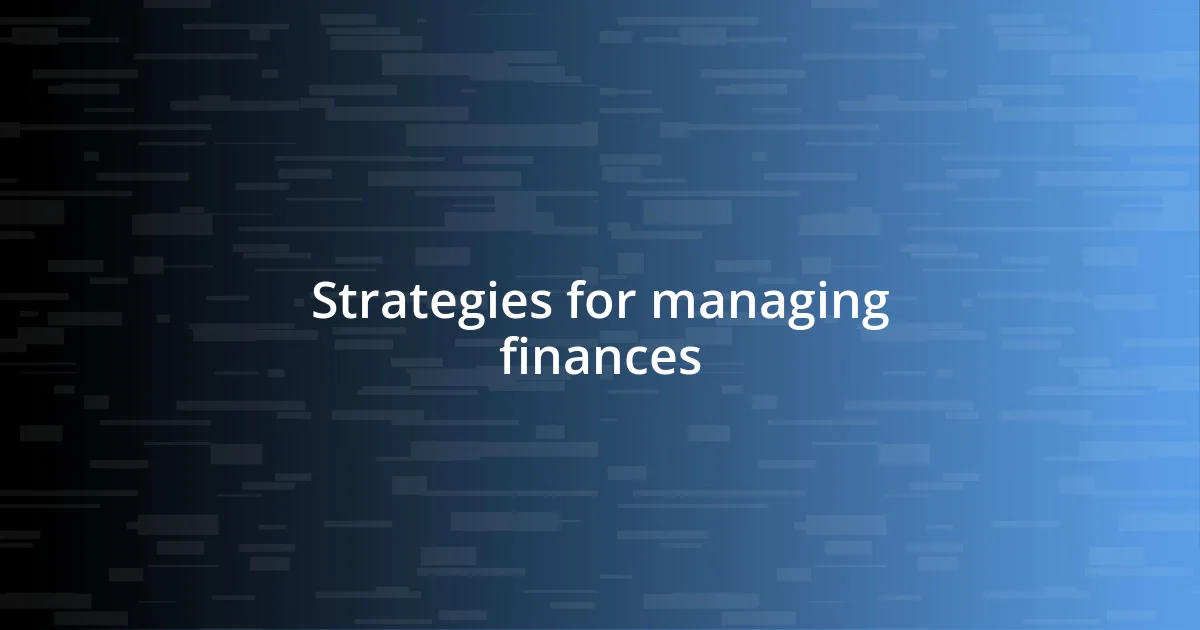
Strategies for managing finances
Staying organized with finances can feel daunting, but I’ve discovered that a simple tracking system makes all the difference. When I decided to jot down every expense for a month, it was eye-opening. I realized how many small purchases added up unexpectedly, sparking a sense of accountability within me. Have you ever noticed how keeping track helps illuminate aspects of your spending you didn’t expect?
One practical strategy I’ve implemented is the 50/30/20 rule, which divides my income into three categories: needs, wants, and savings. This framework has created a balanced approach that feels manageable. I remember the first time I applied it; the clarity it provided allowed me to see where I could cut back on unnecessary expenses without feeling deprived.
Moreover, automating my savings has been a game changer. Every payday, a portion of my income automatically transfers to my savings account. It’s almost like I don’t miss the money because it happens behind the scenes. Have you tried automating your savings? I genuinely believe it has helped me build an emergency fund more comfortably than I could have through manual transfers. In essence, finding and utilizing these strategies has not only made managing my finances easier but has also transformed my relationship with money.
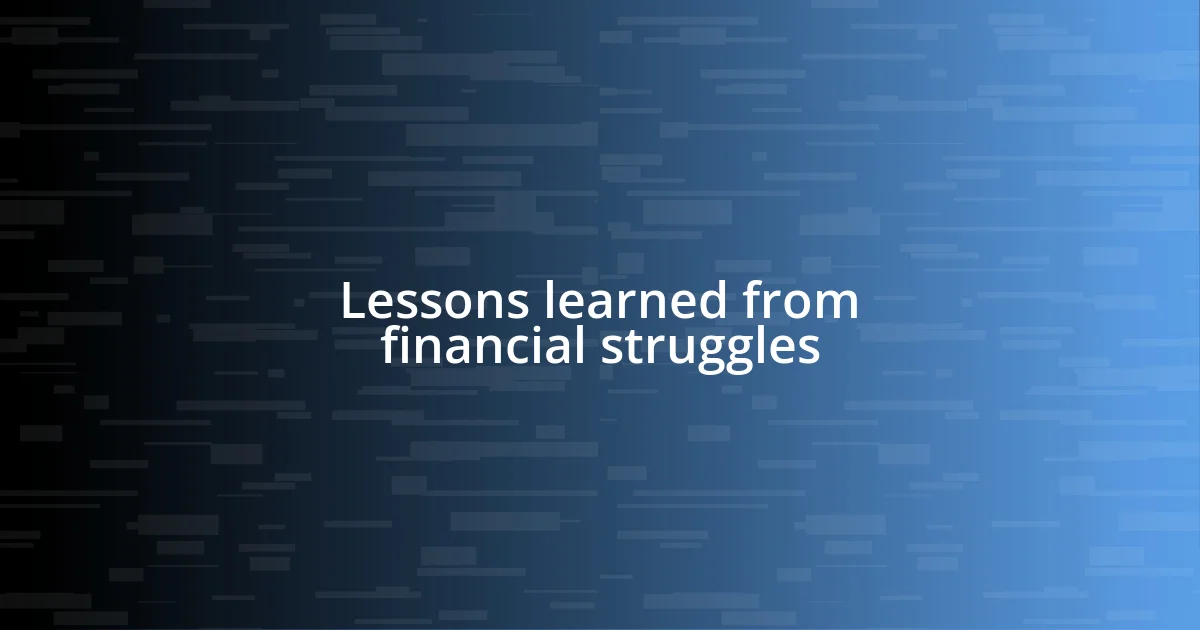
Lessons learned from financial struggles
Financial struggles often serve as powerful teachers. For me, one of the most significant lessons was understanding the importance of resilience. I recall a particularly challenging period where unexpected expenses piled up, leaving me feeling overwhelmed. Instead of succumbing to stress, I focused on what I could control. This shift in mindset taught me that bouncing back from financial setbacks is not just possible but also an essential skill for long-term stability.
I also discovered that being transparent about my financial situation, even with close friends, was liberating. Initially, I hesitated to share my struggles, fearing judgment. But when I finally opened up, I found camaraderie and support. Have you ever felt that sharing your difficulties could lighten the burden? I learned that vulnerability can foster community, and discussing finances allowed me to gain valuable insights from others’ experiences, helping me navigate my own challenges more effectively.
Lastly, I realized the necessity of building a safety net. After facing job instability, I understood that having an emergency fund is not just a financial cushion; it’s a psychological one too. The peace of mind that comes from knowing I have a backup plan significantly reduces anxiety. How do you feel when you have a little extra savings set aside? For me, it transformed my approach to spending and investing, making each financial decision more calculated and less driven by fear.
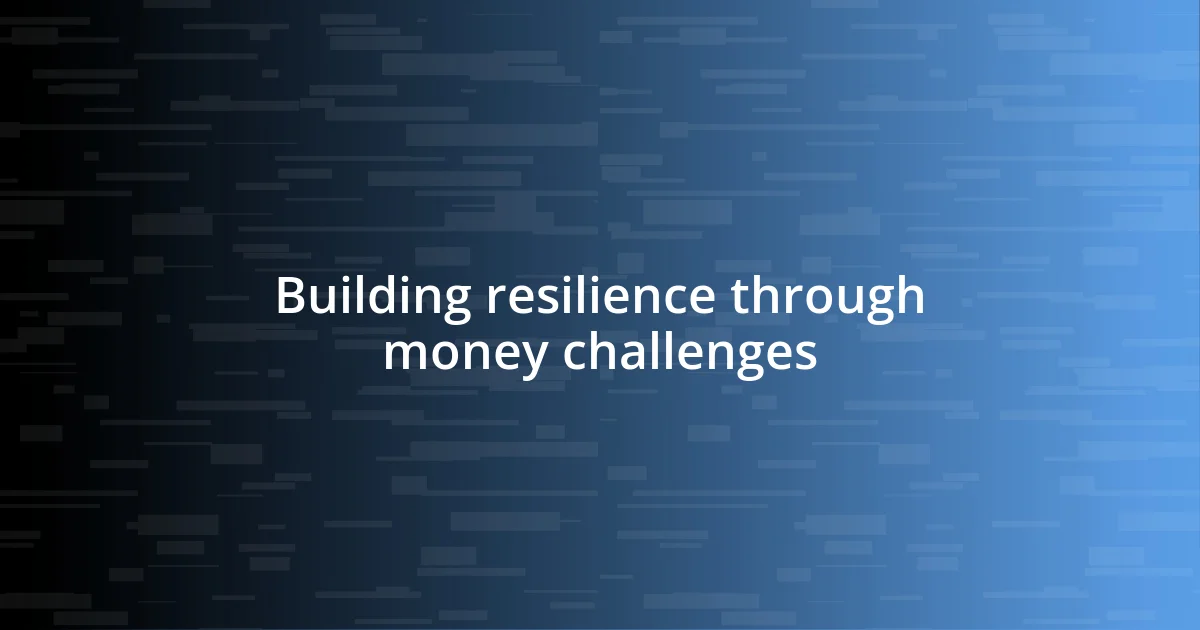
Building resilience through money challenges
Building resilience through money challenges often involves facing uncomfortable truths about one’s spending habits and financial priorities. I remember a time when an unexpected car repair turned my budget upside down. Instead of feeling defeated, I began to see it as an opportunity to learn how to tighten my financial belt. Have you ever turned a setback into a lesson? That experience pushed me to rethink my priorities and develop a more robust strategy for managing unexpected expenses.
Through these challenges, I gained a deeper understanding of what resilience truly means. It’s not just about bouncing back; it’s about adapting and evolving. During a particularly tough month, I found myself having to choose between my usual takeout dinners and cooking at home. I opted for the latter and discovered a newfound joy in preparing meals. It wasn’t merely about saving money; I became more resourceful and creative in my cooking. Have you ever had to make a tough choice that led you to uncover a hidden talent or passion?
Moreover, I learned that resilience also comes from nurturing a positive mindset. When I started viewing financial challenges as puzzles rather than obstacles, my stress lessened significantly. I began to embrace the idea that, although money is essential, it doesn’t define my worth. This shift in perspective helped me remain calm when facing uncertainties, allowing me to approach solutions with a clearer mind. How have your experiences shaped your view of money and resilience? I believe that as we face these challenges, we can emerge stronger and more confident in our abilities to manage our financial futures.

Applying insights for future success
Applying the insights I’ve gained from my money challenges has transformed the way I approach financial decisions. For instance, after learning the hard way about the importance of budgeting, I now create detailed monthly plans that allow me to anticipate expenses effectively. Have you ever felt the relief that comes from knowing exactly where your money is going? This newfound clarity has significantly reduced my anxiety around spending.
One of the most impactful changes I’ve made is setting specific financial goals. I vividly remember the moment it struck me that without clear objectives, it’s easy to drift aimlessly—like a ship without a rudder. So, I began breaking my goals into short-term and long-term targets, which created a motivating roadmap. What about you? Have you tried setting financial goals? The satisfaction I feel in tracking progress keeps me engaged and accountable.
Additionally, I now prioritize regular financial check-ins with myself. At first, it felt uncomfortable to confront my spending habits, but over time, I realized it was an opportunity for growth. Do you ever review your financial situation? By analyzing my monthly budget, I’ve not only kept my expenses in check but also opened paths to discover new savings opportunities. Embracing this practice has made me feel empowered and more in control of my financial future.












